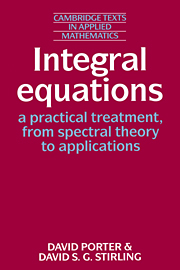Book contents
- Frontmatter
- Contents
- Preface
- 1 Classification and examples of integral equations
- 2 Second order ordinary differential equations and integral equations
- 3 Integral equations of the second kind
- 4 Compact operators
- 5 The spectrum of a compact self-adjoint operator
- 6 Positive operators
- 7 Approximation methods for eigenvalues and eigenvectors of self-adjoint operators
- 8 Approximation methods for inhomogeneous integral equations
- 9 Some singular integral equations
- Appendix A Functional analysis
- Appendix B Measure theory and integration
- Appendix C Miscellaneous results
- Notation Index
- Index
Preface
Published online by Cambridge University Press: 05 June 2012
- Frontmatter
- Contents
- Preface
- 1 Classification and examples of integral equations
- 2 Second order ordinary differential equations and integral equations
- 3 Integral equations of the second kind
- 4 Compact operators
- 5 The spectrum of a compact self-adjoint operator
- 6 Positive operators
- 7 Approximation methods for eigenvalues and eigenvectors of self-adjoint operators
- 8 Approximation methods for inhomogeneous integral equations
- 9 Some singular integral equations
- Appendix A Functional analysis
- Appendix B Measure theory and integration
- Appendix C Miscellaneous results
- Notation Index
- Index
Summary
It often happens that the most concise and illuminating method of solving even the most practical problem in mathematics involves the use of abstract ideas and techniques. This is particularly true of integral equations, where much progress can be made by using both direct and abstract techniques side by side.
The advantage of reformulating an equation, such as an integral equation, as an ‘abstract’ problem in a Hilbert space is that many of the important issues become clearer. In the abstract setting, a function is regarded as a ‘point’ in some suitable space and an integral operator as a transformation of one ‘point’ into another. Since a point is conceptually simpler than a function this view has the merit of removing some of the mathematical clutter from the problem, making it possible to see the salient issues more clearly. It is thus easy to visualise elegant general structures which can be translated into results about the original concrete problem. To obtain these results in a useful form, however, a second step is needed, for elegant general results tend to produce only elegant generalities and a further process is required to recover hard specific facts about the solutions sought. We use the abstract framework of functional analysis to derive the general structures and more ad hoc techniques for the recovery.
There is all too often a gap between the approaches of a pure and an applied mathematician to the same problem, to the extent that they may have little in common.
- Type
- Chapter
- Information
- Publisher: Cambridge University PressPrint publication year: 1990

